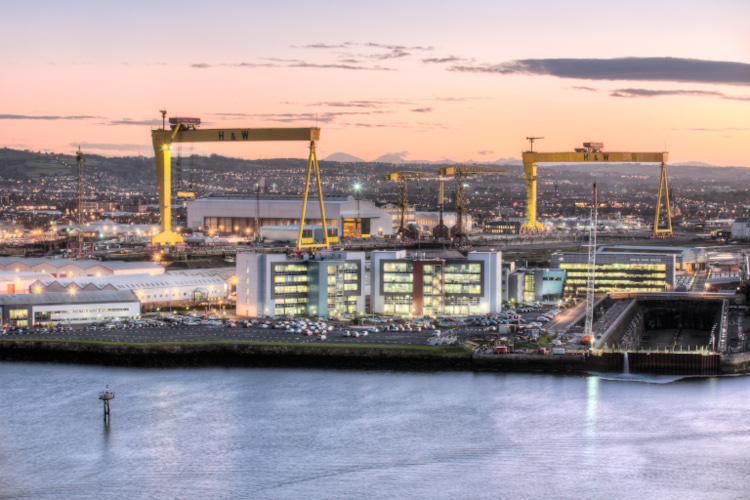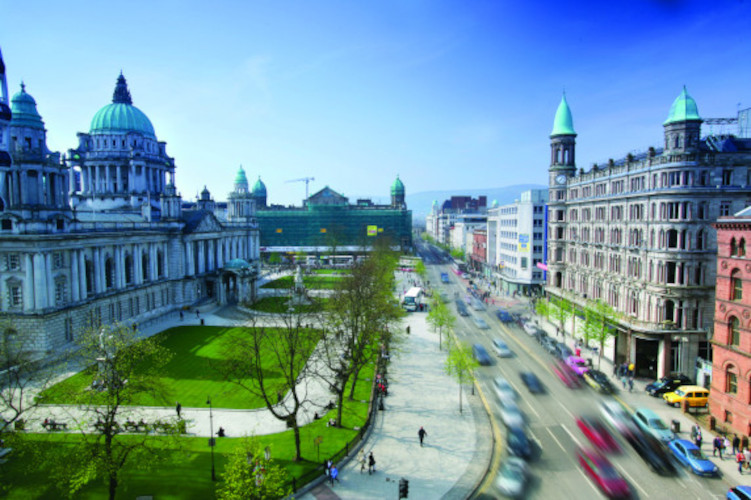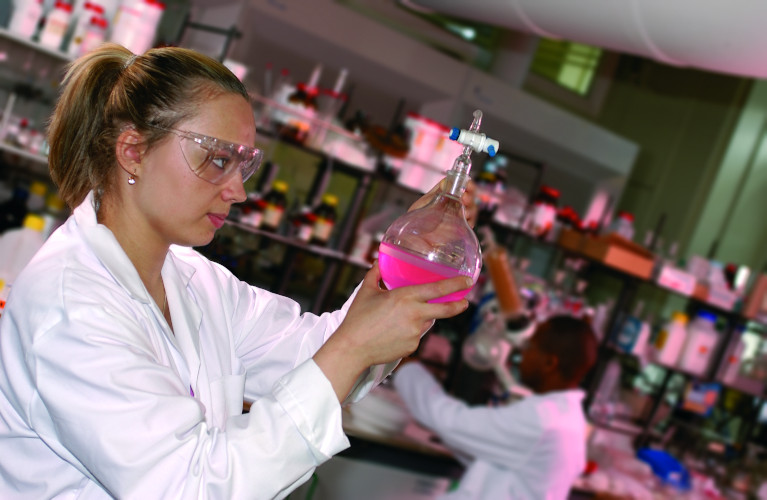If economics is destiny, what does that mean for the NI economy? Do we just have to accept that not everyone will benefit from economic success? And how do we ensure that growth doesn’t come at a cost to the planet? We asked Queen’s leading experts for the answers.
If the rich are getting richer, when will everyone else get a look-in? What does growth look like when you’re trying to consume less? Can net zero be achieved at net cost to ordinary people? Building a sustainable economy that can actually improve people’s lives in this region has never been more urgent.

Brendan Murtagh, Professor of Urban Planning, argues that the economy has to work for everyone if it is going to be sustainable over the long term.
Queen’s graduates are finding great jobs – in finance, cybersecurity, film production. That’s brilliant, but many people and places are simply not connected to that economy. Our post-peace economy is selective. It’s concentrated in south and east Belfast, and it benefits people who have a degree, with the attendant analytical, communicative and collaborative skills. But on the Falls Road and on the Shankill, there are people coming out of school with poor literacy and numeracy and often with no qualifications – yet they are capable people. We need a social economy that will also benefit them.
That’s why the Queen’s Communities and Place initiative is so important. It’s aiming to show how Queen’s research can support community development in three areas: children and young people; education; and my area – community wealth and the social economy. We’re bringing our research and expertise to focus on left-behind places and work with those communities to change the trajectory of their development.
Social economies are driven by social enterprises – community-owned businesses. Often, they trade at high levels – we work with one that has a turnover of £150m, employs 220 people and has £3m worth of assets. They are set up to do a social good and any profits they make are re-invested into their social purpose. We need to scale them up. The fourth largest business in Spain, for example, is a social enterprise – the Mondragon Corporation, which employs 80,000 people in 100 countries.
For example, we’re helping a community in the Markets area in south Belfast develop a social enterprise: a heritage museum. We want to attract tourists not just to Game of Thrones locations but to working-class areas. On the Shankill, we are collaborating with the community to develop their asset base, as they have a lot of derelict sites. One solution could be, for example, locally owned, managed and controlled social enterprises that build and supply local houses. The East Belfast Mission has done just that with an innovative approach to provide community-built homeless accommodation.
We are also working with Ashton, a social enterprise focused on employment and training services based in north Belfast, to see if they can extend their services. Small local businesses need to grow, and they need to collaborate to increase their social impact. For example, if they wanted to get a big government contract, they couldn’t do it on their own, but they could collaborate with other social enterprises to achieve the scale and capacity needed to win these multi-million pound contracts.
Queen’s has a strong reputation for bringing in students from the socially deprived areas and we need to continue that partnership with local people. We don’t just turn up thinking we have all the answers and tell them what to do. And our partners in the community know that knowledge has the power to help them create better futures for them and their neighbourhoods.

Juliana Early, Professor in the School of Mechanical and Aerospace Engineering and Director of the WTECH Research Centre and Head of School, says that buses are at the heart of community life – so it is vital they are sustainable.
When I was at school, I got the bus home every day. For seven years, there was a group of us, from different towns, villages and schools, who sat together and became friends. In Northern Ireland, opportunities to meet and mix are important. It’s one of the reasons why I believe public transport, especially buses, isn’t just about vehicles. It’s about what those vehicles and journeys make possible.
And this is where my work on clean propulsion technologies comes in, understanding how we can continue to evolve and reshape our public transport systems to meet our ambitious climate targets. Hydrogen, for example, could play a vital role in our future transport systems. At Queen’s, we are part of a large consortium with Wrightbus, Ryze Hydrogen, Grayson Thermal and Translink, collaborating on a project valued at more than £11m and funded through the Advanced Propulsion Centre, to examine these hydrogen economy opportunities and what they will mean for our future bus transport.
Our involvement in consortia like this accelerates the development process beyond what any one partner could achieve in isolation. Indeed, we have an established track record at Queen’s of doing this successfully and achieving real impact in society.
For example, we’ve worked with Wrightbus and Translink on a project, funded by the Advanced Propulsion Centre’s Advanced Route to Market Demonstrator programme, to develop a prototype single-deck hydrogen fuel cell vehicle. In December 2020 it didn’t exist as a design. By September 2021, the GB Kite Hydroliner was built and displayed at the Cenex LCV (Low Carbon Vehicle) 2021 event. And by November 2021 Go-Ahead Group, which provides public transport across the UK, had ordered 20 of the single-deck hydrogen buses for Brighton & Hove and Metrobus. This is what we enjoy doing – translating fundamental knowledge and methods into real products that will positively impact on our environment.
My work might begin with modelling efficient energy consumption on board the vehicle, but it must also consider where the energy is coming from, whether its supply is secure, and what the impact will be on all users and stakeholders in those systems. These are vital questions. If we can move public transport away from diesel, scaled up across the UK we could save up to four billion litres of imported diesel and prevent 3.2 million tonnes of CO2 being released over the next 10 years. That could be a major contributor to achieving our carbon net zero ambitions.
To help us answer questions like this, we have been awarded just over £2.6m (through a UKRI Engineering and Physical Sciences (EPSRC) funded Prosperity Partnership) which is continuing to help us understand more about these complex, wide-system interactions, how new emerging technologies will shape our future public transport system and develop new approaches to answering these questions. It's a really transformative point in time in the sector with really exciting opportunities.
We can already see the technologies and strategies we've been a part of developing being used in vehicles in operation around the globe, and it is incredibly satisfying to know that the research that we are doing is genuinely impacting on people's lives.

Scott Rutherford, Director of Innovation Programme (Belfast Region City Deal), says that the City Deal is not just for Belfast. Or even Belfast Region. And don’t believe anyone who tells you otherwise.
Over the past few decades, many Western economies have pursued policies that have, unintentionally, driven huge inequalities. In Belfast, for example, we have very poor attainment levels in some pockets of the city, and many people who struggle to get back into the workforce. Compared to the UK average, we have low levels of innovation within businesses: they struggle to adopt new technology and new ways of working, or to access new markets. And our productivity level persistently sits at about 80 per cent of the UK average.
We want people from all walks of life to benefit from economic growth, and we’re working within the City Deal to help us do just that. The Deal is a package of funding aiming for around £1bn investment over the next decade, designed to stimulate economic growth and recovery in those places that have been left behind. It covers the Belfast region, but it will benefit businesses from much further afield.
At Queen’s, our role in the City Deal will focus on accelerating science and research into business in an inclusive way, and ensuring we deliver this through local decision-making, civic leadership and partnership. We will translate ideas from university research into new facilities, programmes and technologies, then get businesses to trial some of these ideas and de-risk them, before they make the big step of investing in them for their own companies. We’re trying to bridge the chasm that exists between a new idea and what the market needs.
For example, manufacturing businesses are all grappling with moving to new green technologies and adapting to automation. Huge amounts of aggregate materials are crushed and produced here. That takes heavy machinery that currently uses fossil fuels. Manufacturers will need to find ways to replace these. A facility like ours would allow companies to trial these technologies first and make sure they can work in prototype.
Another project looks at clinical trials and how we give patients access to the newest types of treatments available and then accelerate them to market. We also want to look at how we can use data to better understand the types of new treatments we introduce. Our thinking is that with better data that is used to support clinical trials, perhaps through wearables, we can understand much better what the effects of treatments are in real life.
There are transformative opportunities happening here. It’s about building a knowledge economy that has huge direct and indirect benefits filtering through all of society. For every knowledge economy job created, local research shows a twofold benefit in terms of all the other jobs that are created through the whole economy. We’re only 10 months into the delivery phase of the City Deal, but already we are starting to get plans of what the facilities will look like. We are sitting down with clinicians, academics, aerospace engineers and hydrogen bus makers. It’s a long-term project, and if we get it right, the next generation will reap huge benefits.

Gosia Swadzba-Kwasny, Professor of Inorganic Chemistry, says that you can’t change the world without cross-sector and multidisciplinary partnership.
If we want a sustainable and transformative economy, we need new ideas and serious industrial buy-in. Without fundamental discoveries, you can’t achieve technological breakthroughs. And without industrial collaboration, those great ideas will just stay on paper. At the Queen's University Ionic Liquid Laboratories (QUILL) Research Centre, we’re dedicated to industry-academia partnerships. Our expertise lies in ionic liquids: solvents that are conductive, non-flammable and do not explode or evaporate. We start with fundamental science, explore ideas that wouldn’t be considered outside academia, and present them to our industrial partners. All our partners look to achieve net zero emissions by 2050, and it’s very satisfying to see how our work with them might help achieve that.
Take, for example, clean gasoline production by Chevron. Alkylate gasoline is the cleanest burning and least polluting type of gasoline. But a very dangerous compound called hydrofluoric acid was used in the production process. Supported by our expertise in ionic liquids, Chevron were able to come up with a process using a safer ionic liquid alternative, which is not volatile and much safer to humans, animals and the environment. It was a triumph of sustainable chemistry, where we made an old process safer and more sustainable. The new process is now commercialised and operating in Chevron’s plant in Salt Lake City; they have also licensed it.
We’re now work with Chevron on another vital global challenge: a clean water project, led by Professor John Holbrey. Clean water for human consumption is, of course, essential. But clean water is also needed for water-splitting electrolysis, part of the process for producing hydrogen – which could be a cleaner substitute for fossil fuels. That’s why we are now exploring ionic liquid-based techniques for low-energy water purification, crucial for the modern economy.
Our biggest collaboration is with Petronas, who have been our partners since 2007. I am currently leading on a programme comprising eight research projects, all driven by the sustainability agenda aiming for a net-zero economy and focused on delivering this global shift to a post-fossil fuel energy landscape. Through this partnership, we are not only developing new technologies, but also train Petronas staff in sustainability research through a very successful PhD studentship programme.
It’s hugely rewarding to work with industry in all these different ways, and to work with such versatile materials as ionic liquids, because they enable research in really diverse areas. Professor Peter Nockemann is currently working (in close partnership with Shell) on ionic liquids used as safe, non-flammable electrolytes in batteries: sustainable energy storage is, of course, another key to a greener future.
Last, but not least, I should mention QUILL’s work on the recovery of metals of critical importance, called rare-earth elements. These are absolutely crucial for uses in electric cars and electronic devices, but their secure supply to the UK and EU is endangered by political conflicts. Professor Nockemann’s startup company, Seren Technologies, has developed a technology for the separation of rare-earth elements using ionic liquids. They have been recently bought by Ionic Rare Earth, an Australian company, which has joined QUILL IAB and funds a growing research programme at Queen’s. We are particularly proud that proximity to QUILL has driven Ionic Rare Earth to seek a location for their pilot plant in Northern Ireland, and we are very much looking to support them in developing their unique technology further.
Top of Page